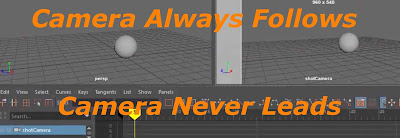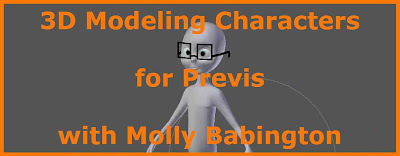 |
| The 180 Degree Rule |
We also have a series of tutorials on Cinematography, Camera, Previsualisation & 3D Layout.
All of the above are essentially ways of describing the same problem - how to tell a story visually, with a series of still or moving images.
What is an Establishing Shot? What is "Crossing The Line"? Watch our playlist below to find out.
Introduction to Cinematography with Clement Gharini
 |
| Cinematography - Who Needs It? |
How to Create a Shot Camera in Maya
 |
| How to Create a Shot Camera in Maya |
To get started on How to Create a Shot Camera in Maya, read this blog post.
https://escapestudiosanimation.blogspot.com/2024/01/how-to-create-shot-camera-in-maya.html
https://escapestudiosanimation.blogspot.com/2024/01/how-to-create-shot-camera-in-maya.html
Introduction to Animating Cameras with Marc Stevenson
In this short video, Escape Studios tutor Marc Stevenson offers an introduction to the use of cameras in Maya, including the basics of different kinds of shots.
The Art of Composition - Brad Bird and "The Magic Circle"
 |
| Brad Bird and "The Magic Circle" |
Why Animators Should Never "Cross the Line"
 |
| How Not to "Cross The Line" |
What is "Crossing The Line?" - And How to Avoid it.
Why Animators Should Avoid a Flat Horizon
Flat horizons are one of the curses of 3D animation - nothing gives the game away faster than a blank, flat ground plane extending into infinity.

Animation: Camera, Previsualisation & 3D Layout
Camera Follows, Never LeadsCamera always follows the action, never leads, with Alex Williams
https://www.youtube.com/watch?v=_L5zlhH9UWg
For more on why camera should follow the action, never lead, see this blog post.
"Previs Chess" with Sagar Rathod
In this short video tutorial titled "Pre-Vis Chess", Escape VFX tutor Sagar Rathod explains how the previsualisation ("previs") process works in vfx film-making. What is previs? What is it for, and how do digital artists use it to solve practical film-making problems?
Creating Characters for Previs
Tutorial by Molly Babington
https://vimeo.com/456540020

In this video, our MA student in Storyboarding and Previz Molly Babington shows her approach to 3D modeling for Previz.
Molly shows how to interpret a blueprint drawing by editing the elements of design where needed.
Create a Shot Camera in Maya
Create a Shot Camera in Maya
How to create a shot camera in Autodesk Maya - Beginner Tutorial with Alexander Williams
Camera Matching in Maya with fSpy
 |
| Camera Match with fSpy |
To achieve the correct perspective, crucial details from the backplate, such as resolution, camera model, and focal length, must be considered.
The Escape Studios Animation Blog offers a personal view on the art of animation and visual effects. To find out more about our new BA/MArt, now recruiting for September 2024 follow this link. To apply, visit the official page here.
The Escape Studios Animation Blog offers a personal view on the art of animation and visual effects. To find out more about our new BA/MArt, now recruiting for September 2024 follow this link. To apply, visit the official page here.




I read your blog and find it very interesting. 3D animations are digital sequences that depict movement and action in three-dimensional space. Created using specialized software, they involve modeling, texturing, rigging, and animating virtual objects or characters. These animations find applications in various industries, including entertainment, advertising, education, and engineering, to visualize concepts, convey narratives, simulate scenarios, and entertain audiences with lifelike and dynamic visuals. If you're interested in learning more about 3d animations , we invite you to visit this page where you'll find a wealth of resources, including articles, guides, and case studies.
ReplyDelete